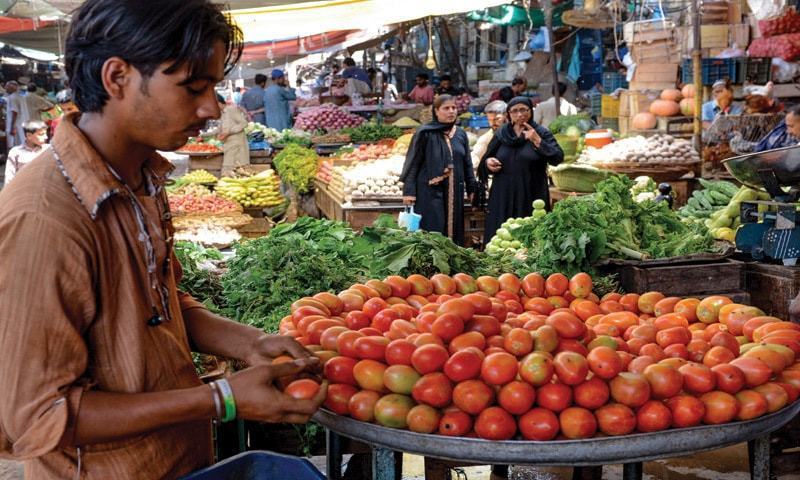KARACHI/ISLAMABAD: Arrival of imported vegetables has failed to bring any relief as prices of tomato and onion hit new peaks of Rs200 and Rs80 per kg from Rs150-160 and Rs50-60 per kg, respectively.
Consumers are already paying Rs600 per kg for imported ginger while some greedy retailers are demanding Rs700, terming it as the best quality.
Retailers said suspension in arrival of Iranian tomato and onion and Afghan onion in the last one week has led to further jump in prices.
They said Balochistan crops of both onion and tomato had so far proved insufficient thus paving the way for import of these commodities from Iran and Afghanistan.
Commissioner Karachi’s retail rates for tomato and onion have also been raised to Rs168 and Rs73 from Rs93 and Rs43 per kg, respectively on October 1. As of September 1, the official retail rates of the two vegetables were Rs58 and Rs41.
Consumers were of the view that they cannot expect any price relief when the regulator had been increasing the rates so frequently instead of checking whether the prices had been jacked up artificially or because of any demand and supply gap.
The quality, taste, colour and overall appearance of imported tomatoes and onions are different as compared to the locally produced ones.
People were seen limiting their tomato buying as per their requirement since not many can afford Rs200 per kg.
However, consumers had paid Rs400 per kg for tomato in November 2019 despite allowing imports from Iran to curb soaring prices.
Falahi Anjuman Wholesale Vegetable Market President Haji Shahjehan said tomato and onion prices had also risen in Lahore with almost the same rate as Karachi.
He said prices may remain under pressure as Sindh’s onion crop would start arriving in late October and would reach its peak in November and December while tomato crop from various areas of Sindh in limited quantities would start from third week of October.
NPMC reviews pricing situation
Meanwhile in Islamabad, the National Price Monitoring Committee (NPMC) on Monday held a meeting to identify reasons for abnormal variation in prices of tomatoes, potatoes, onions as well as other essential items like wheat, sugar and chicken.
Headed by Special Secretary Mohsin Mushtaq Chandna, the meeting reviewed various proposals to tame prices and was attended by representatives from provincial governments and various divisions.
The meeting observed that an upward trend was witnessed in prices of perishable commodities during September-October. The reason cited for this was unprecedented rainfall, which adversely affected the local produce.
The price hike is likely to stabilise by November onwards when local produce would be available in the markets. It was observed with concern that the difference between wholesale and retail prices of the essential commodities is becoming a serious challenge for provinces.
Representative from the Ministry of Food Security has informed that seven vessels carrying 0.433 million tonnes of wheat from the private sector have been arrived in the country while Trade Corporation of Pakistan has been allowed to import 1.650m tonnes. The TCP has so far arranged 0.330m tonnes which is expected to arrive in October (four ships) and in January 2021 (two ships).
The official from the Ministry of Industries and Production informed that TCP will import 151,700 tonnes of sugar, adding that private dealers’ stocks of 0.445m tonnes are available till November 4 whereas Sindh Cane Commissioner reported total stock of sugar at 0.565m tonnes which will be available till November 9.
The representative from Punjab government said that crushing of sugarcane will be started in the first week of November. Punjab government has imposed heavy fine through legislation in order to expedite the timely crushing of sugarcane whereas the official from Sindh also informed that crushing will start by mid of November.
The NPMC called upon the district administrations to remain vigilant and control the rates of essential commodities namely tomato, potato, wheat, sugar etc through strict price enforcement.
The focus should be to minimise disparity between the wholesale and retail prices of the essential commodities which leads to inflation. The chair urged the provincial governments to take corrective measures to check undue profit margin in basic crops.
Published in Dawn, October 6th, 2020














































